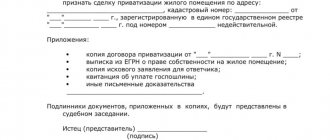What it is?
A privatization agreement is a document on the basis of which an apartment that previously belonged to the municipality or, less commonly, to the state is transferred to citizens. It is concluded between two parties:
- Local government, which previously owned housing and provided it to citizens under a social rental agreement.
- The tenants with whom the housing code was signed in accordance with the procedure provided for by the Housing Code of the Russian Federation entered into a social rental agreement for residential premises.
After the paperwork for privatization is completed, a copy of the agreement remains in the hands of the citizen. It is on the basis of this document that the subsequent registration of rights to the apartment takes place with the Rosreestr authorities.
Attention : Drawing up an agreement does not require certification by a notary. State duty is also not charged.
Which apartments can be privatized
Premises provided under social rent are transferred to the ownership of individuals. The rules for obtaining such living space are regulated by Art. 672 of the Civil Code of the Russian Federation. The basis for inclusion in the number of purchasers of real estate is registration. Family members of the employer have equal rights. The decision on privatization is made jointly.
Temporary disposal does not prevent the conclusion of the transaction. The circle of owners includes residents called up to serve in the armed forces, patients hospitalized for a long time, and those sentenced to imprisonment. Agreements concluded in circumvention of such persons are declared invalid (decision of the Sovetsky District Court of the city of Ivanovo in case No. 2-199).
The list of objects that do not fall under the scope of Law No. 1541-1 is enshrined in Art. 4. The subject of a voluntary transfer agreement should not be:
- emergency real estate;
- housing in military camps;
- dormitories;
- service apartments (with the exception of state farms and agricultural enterprises);
- reserve of areas of social protection bodies in agricultural areas.
The law also provides for reverse privatization. Authorities can purchase real estate from citizens for the purpose of its rational distribution. Transactions are concluded on a voluntary basis.
How is it processed?
Regarding the form of the agreement, the Civil Code of the Russian Federation and the Law of the Russian Federation “On the privatization of housing stock in the Russian Federation” establishes only one requirement: the agreement must be drawn up in writing . In practice, local authorities often approve a standard form of agreement used in a particular municipality.
If the contract form has been approved, its preparation, in essence, comes down to only filling out the empty columns with the necessary information. This is usually done by specialists from the relevant departments of local authorities involved in the management of municipal property.
However, the law does not prohibit the use of independently prepared contracts .
If all the necessary conditions and information are indicated, even an agreement that the citizen prepared independently can be accepted and signed.
Why and when is this title document needed?
In the privatization process, the signing of such agreements is considered the penultimate stage. He completes the procedure for interaction with local executive authorities. Full disposal of the apartment becomes available to the owners when an application for registration is additionally submitted.
An entry in the Unified State Register is made on the basis of the information contained in the agreement. If there is no record, then the housing situation remains unclear.
In the absence of an agreement, the following actions will be impossible for the homeowner:
- Transfer to relatives by inheritance or on the basis of a will. Or according to the law from the Civil Code of the Russian Federation.
- Exchange. If there is no paper, the housing seems to be no longer municipal, but the citizen’s property is also not registered. It will not be possible to exchange this object even for other municipal real estate.
- Donation to any other person.
- Sale on the secondary housing market at a price set depending on interests.
Therefore, it is necessary to draw up a document recording the will of the parties, the very fact of transfer of housing.
During privatization before 1994, there is often no information in the Unified State Register of Real Estate. After all, the procedure for registering actions with an apartment was constantly changing. Then the apartment is first registered, and then a deal is concluded to obtain ownership of the property.
Registration procedure and content
The agreement is drawn up at the last stage of the privatization process, when all the necessary documents are collected by citizens, transferred to the municipality and verified there by authorized employees. In general, the procedure looks like this :
- A legal or other municipal service prepares the text of the document with all the necessary information.
- Citizens who wish to participate in privatization sign an agreement.
Those who previously gave a written refusal to register ownership of a share in the apartment do not participate in the signing. - Signed copies of the agreement are divided. One remains in the archives of local authorities, the second is later transferred to Rosreestr. The remaining copies in an amount equal to the number of residents who signed the agreement are given to them.
The contents of the agreement itself include the following:
- “Hat” with the name of the agreement, its number, date and place of drawing up.
- Indications on the parties to privatization - the local government authority represented by the head of the municipality (or another person who has been given the appropriate powers) and citizens registered in the transferred apartment.
- Description of the apartment indicating its area, address and other significant characteristics.
- An indication that the transaction is free of charge.
The latter is especially important, since in addition to the Law of the Russian Federation No. 1541-1 concerning the privatization of housing stock, Federal Law No. 178 “On the privatization of state and municipal property” is also in force in Russia . In accordance with the provisions of this act, citizens can obtain ownership of an apartment not only through free privatization, but also by purchasing it from the local authorities.
Do I need to register?
After the agreement is signed by the parties, it must be taken to Rosreestr or MFC for registration. However, in this case, it is not the contract itself that is registered, but the new rights that arose on its basis.
In fact, during privatization, one party (the municipality) loses the right of ownership of housing, and the other (one or more residents who previously lived in the apartment on the basis of social rent) acquires this right. It is the transfer of rights that must be registered and entered into the Unified State Register of Real Estate.
How does the transfer of housing take place?
The opportunity to privatize residential premises is provided on a voluntary basis, that is, it is a right, but not an obligation of a citizen, therefore a person can refuse to participate in privatization (in this case, the refusal must be drawn up in writing and certified by a notary office).
Not every residential property can be registered as a property. It is impossible to privatize the following real estate objects:
- located in closed military cities;
- recognized as emergency;
- related to office premises;
- located in dormitories.
Housing reserved by a citizen or occupied by him on social rent in buildings of municipal and state housing stock is subject to privatization, on the basis of Article 1 of Federal Law No. 1541-I of 1991 on July 4.
Who can privatize the premises?
Privatization can be formalized either in favor of one citizen or as the common property of several persons.
In order to transfer ownership of housing, it is required to obtain the consent of all persons who have reached the age of 14 years, living in the apartment that is subject to privatization (that is, having the right to part of this property).
Possible problems and their solutions
What to do if there is an error in the text?
There are no ideal people who don't make mistakes. Local government employees preparing contracts are no exception. What can you do if there is an error in the text of the contract?
You can correct the situation as follows:
- If the registration of the right has not yet been completed, you can destroy the old copies of the agreement and sign new ones, without errors.
- You can conclude an additional agreement, indicating in it exactly what correction is being made to the text of the agreement.
- Finally, if the error is significant and prevents you from registering the right, you can go to court. In this case, an application to establish the fact is submitted in the manner established by the Code of Civil Procedure of the Russian Federation. In particular, this is practiced if everything in the text of the document is correct, but the name of one of the new homeowners is misspelled, and it is unrealistic to bring everyone together to re-sign the contract or agreement thereto.
IMPORTANT: If the error concerns shares in the right to an apartment, then the court remains the only option.
The same procedure is provided for when renting housing, that is, you can conclude an additional agreement. agreement to the lease agreement.
If concluded, but the right is not registered
Another common situation is when the parties have successfully signed a document, but the registration of the right in the Unified State Register through Rosreestr has not yet taken place. In this case, the only way out is to contact the registration authorities (directly or through the MFC) and finally complete the procedure.
In 1993, the Plenum of the RF Armed Forces established that registration must be carried out no later than 2 months after signing. However, now the current regulations have changed significantly - and it is almost impossible to monitor compliance with this requirement.
However, it is better not to delay the registration procedure . Citizens must remember that before entering information into the Unified State Register of Real Estate, they cannot call themselves the owners of the apartment, just as they cannot make any transactions with it - even rent it out for commercial rent.
If registration is delayed due to the fault of local authorities or Rosreestr employees who unreasonably refuse to register the right, the issue can be resolved by filing a petition with the court.
How to restore a lost contract?
It happens that people lose their privatization agreement, which creates unnecessary hassle. The lost document needs to be restored, and the sooner the better. The absence of a contract makes it difficult to buy and sell, exchange, pledge, and inheritance of housing.
Restoration involves issuing a duplicate of the privatization agreement . The legal force of the document is not inferior to the original. The question arises, who issues duplicates and how to get it?
Procedure for recovering the loss:
- Remember who gave you the original document, find the address of the municipality.
- Submit an application for a duplicate of the contract.
The application can be submitted in any way: in person, by mail, through a legal representative (for children), by power of attorney, through State Services.
- Please wait while your application is processed.
- Get a finished duplicate.
There are cases when the administration refuses to issue a duplicate. This usually occurs through the fault of the applicant himself. For example, if you provide an incomplete list of documents, you will violate the structure of the application... Having eliminated the violations, you can apply for a duplicate again. If the refusal is not motivated by anything, seek legal protection.
Is it possible to terminate?
The legislation allows not only to privatize an apartment, but also to terminate the contract. This is possible in the following situations:
- The contract was initially concluded with violations. In this case, it is terminated through the court at the request of the interested party.
- Voluntary termination occurs (“deprivatization”, deprivatization). In this case, the owner of the property does not actually terminate the contract - he enters into a new one on the transfer of the apartment back to the ownership of the municipal authorities.
In turn, deprivatization usually occurs for the following reasons:
- A citizen discovers that he cannot financially maintain an apartment. The fact is that property tax is paid on owned housing (Chapter 32 of the Tax Code of the Russian Federation). For housing, it is paid at the cadastral value - and it is now increasingly approaching the market value. In addition, the owner pays for major repairs and maintenance of common property. The resulting amount could be significant.
- Safety. Lonely elderly people often become victims of scammers and so-called “black realtors” if they own apartments. To get rid of the threat, some of them prefer to return the housing, which there is no one to bequeath, back to the ownership of the municipality.
- Chance to get more living space. Citizens who own housing do not participate in local programs to improve housing conditions. Therefore, returning an apartment and living in it again on the basis of social rent is an opportunity for many to take part in such a program.
The deprivatization procedure is as follows:
- The owner (or owners, if there are several of them) of the apartment writes an application to the local government authority. In the application they indicate that they wish to transfer the apartment into municipal ownership free of charge.
- Municipal specialists consider this issue within no more than 30 days and either agree to deprivatization or refuse it. The law does not provide for the possibility of forcibly taking back housing.
- A new real estate transfer agreement is signed.
- The newly emerged property right is registered in the Unified State Register of Real Estate.
IMPORTANT : A deprivatized apartment cannot be re-privatized!
§ 3. AGREEMENT FOR TRANSFER OF PRIVATIZED HOUSING TO CITIZENSIn accordance with the Law on the Privatization of the Housing Stock, the transfer of residential premises into the ownership of citizens is carried out by the relevant local administration bodies, enterprises and institutions to which the housing stock is assigned, respectively, with the rights of economic management or operational management. Such transfer is made on the basis of an agreement between the above-mentioned bodies and organizations and citizens purchasing housing as their own. An agreement on the transfer of housing into the ownership of citizens is concluded by a local administration body, an enterprise, an institution with a citizen receiving residential property in ownership, in the manner established by the relevant executive authority. The contract for the transfer of housing through privatization differs from the contract for the purchase and sale of residential premises in that, unlike the contract for the sale and purchase; which is of a paid nature, the contract for the transfer of housing through privatization is free of charge. A housing transfer agreement is similar to a gift agreement, however, unlike a gift agreement, under which the donee only accepts the gift (or refuses it), in a housing transfer agreement by privatization, the person who wants to privatize housing takes the initiative to do so by submitting an application (request) for the transfer of housing to him. Citizens are also obliged to use residential premises only for living, and to carry out reconstruction and redevelopment in residential premises only with the permission of the local administration. At the same time, when citizens privatize apartments in buildings requiring major repairs, the landlord retains the obligation to carry out major repairs in accordance with the standards for the maintenance, operation and repair of the housing stock. Maintenance and repair of a residential building as a whole, according to the transfer agreement, is carried out by housing maintenance and repair and construction organizations servicing this house before the start of privatization. The agreement for the transfer of an apartment into the ownership of citizens is concluded in simple written form, is not subject to notarization, and no state duty is charged on it (Article 7 of the Privatization Law). In the application of citizens for the transfer of ownership of residential premises to them, they indicate into which common (joint or shared) ownership they are asking to transfer the apartment they occupy, the members of the tenant’s family, and their consent to privatization are indicated. The contract for the transfer of residential premises into the ownership of citizens also includes minors who have the right to use this residential premises and live together with persons to whom this residential premises is transferred into common ownership with the minors, or minors living separately from these persons, but who have not lost the right to use this property. living space. Citizens acquire ownership rights to privatized residential premises after (from the moment of) registration of the agreement with the BTY. In addition to the text of the agreement, the citizen privatizing residential premises receives a certificate of ownership of the privatized apartment (residential building). In practice, there are cases when during the life of the tenant the privatization of the residential premises was not completed, in particular in connection with his death during the period when the privatization of the apartment was being processed, and often the courts receive statements of claim to recognize the deceased as the owner of the apartment. The Plenum of the Supreme Court of the Russian Federation, in its resolution No. 8 of August 24, 1993, explained that if a citizen who submitted an application for privatization and the necessary documents for this died before the execution of an agreement for the transfer of housing into ownership or before the registration of such an agreement with the relevant local administration body , then if a dispute arises regarding the inclusion of this residential premises or part of it in the inheritance mass, it must be borne in mind that this circumstance in itself cannot serve as a basis for refusing to satisfy the heir’s claim. The housing legislation of the Russian Federation provides for the opportunity for a tenant living in a communal apartment to purchase residential premises for the other tenants of this apartment with their consent and transfer these premises into their ownership, and occupy the entire apartment himself without additional payment and privatize it in the prescribed manner (see. Article 16 of the Law on the Fundamentals of Housing Policy). In addition to the agreement on the transfer of ownership of the apartment, citizens are issued a Certificate of Housing Ownership in the prescribed form. Citizens who have become owners of residential premises own, use and dispose of them at their own discretion; they have the right to sell, bequeath, rent or lease these premises, as well as make other transactions with them that do not contradict the law (see Article 3 of the Law on Privatization). At the same time, citizens who are the owners of residential premises exercise the rights of ownership, use and disposal of residential premises belonging to them in accordance with its purpose, that is, for the residence of citizens (the owner himself, members of his family) or by renting it out to other persons on the basis of an agreement. Members of the owner's family living in residential premises belonging to him, including those transferred through privatization, have the right to use this premises under the conditions provided for by housing legislation. They have the right to demand elimination of the violation of their rights to residential premises from any persons, including the owner of the residential premises. To carry out transactions in relation to privatized residential premises in which minors live, regardless of whether they are owners, co-owners or family members of the owners, including former owners, who have the right to use this residential premises, prior permission from the guardianship and trusteeship authorities is required. This rule also applies to residential premises in which minors do not live, but at the time of privatization they had equal rights to this residential premises with the owner (Part 2 of Article 3 of the Law on Privatization was introduced by Federal Law of August 11, 1994 No. 26-FZ ). Funds from transactions with privatized residential premises in which only minors live (lived) are credited by parents (adoptive parents), guardians (trustees), administration of children's or other educational institutions of the relevant purpose to a deposit account in the name of the minor at a local branch of a savings bank (h 3 Article 3 of the Law on Privatization was introduced by Federal Law of August 11, 1994 No. 26-FZ). Citizens who become owners of an apartment assume responsibilities for paying real estate taxes, reimbursement of expenses for repairs, operation and maintenance of the apartment, house, its engineering equipment and local area based on the agreement of the parties to the transfer agreement. The current tax legislation provides that the tax on privatized area is 0.1% per year of its assessed value, determined by the BTI. In practice, sometimes there are cases of deprivatization of residential premises, which is expressed in the fact that a citizen, who at one time exercised his right to privatize housing, renounces the ownership of this premises, remaining to live in it as a tenant. As motives for the deprivatization of housing, citizens put forward the following grounds: privatization under the influence of deception, violence, threat, or significant misconception; fears of incurring significant financial costs (elderly people are especially afraid of this); the desire not to take on the responsibility of reimbursing the costs of home repairs; the desire to obtain a larger municipal area in exchange for the occupied apartment, etc.). The issue of deprivatization of housing is decided by the executive authority or local government. Based on the application of citizens who wish to renounce the right of ownership of privatized residential premises, the relevant executive body, local government body or persons authorized by them accept the residential premises transferred to them, with the inclusion of this premises in the prescribed manner in the state or municipal housing stock, and conclude with social tenancy agreements for this premises by such citizens. In case of a dispute, the issue is resolved by the court.
How to get a duplicate?
In the event that the contract itself is lost, a citizen can receive a duplicate of it . To do this, he needs to submit an application to the relevant local authority.
In addition, if privatization took place recently (that is, before 2004, when the modern registration service was formed), one copy of the agreement may be available in the Rosreestr archive. If necessary, you can request a copy there too.
Finally, if all documents are completely lost, which is extremely unlikely, the contract can be restored and ownership of the apartment recognized in court.
Invalid
If any of the mandatory conditions are violated, the contract is declared invalid with all the ensuing consequences. This is carried out in court within a year after the conclusion of the contract. The court recognizes it as invalid if one or more conditions are met:
- if any of the participants were misled;
- he was imprisoned under pressure;
- any of the participants was incapacitated at the time of conclusion of the agreement;
- any of the permanently registered persons did not take part in privatization;
- the rights of minors were violated.
A statement of claim may be filed by owners, persons registered at this address on a permanent basis, representatives of government bodies, guardians, guardianship authorities and prosecutors. Therefore, it is very important to comply with all conditions. Then possible troubles will be avoided and the right to alienate real estate will appear, if necessary.
Grounds for invalidation
In some situations , the agreement under which the apartment was privatized may be challenged in court and declared invalid. This is possible in the following cases:
- Minors were not included in the privatization. The law does not provide for the possibility of refusing privatization even with the consent of the guardianship authorities.
- The agreement was signed by a person who did not have full legal capacity due to health or age.
- The citizen who entered into the contract acted under duress or was misled.
- On the part of the administration, the document was signed by an employee who did not have the authority to do so.
There may also be other grounds provided for by the rules of the Civil Code of the Russian Federation regarding the invalidity of transactions.
A specialist talks about invalidating a privatization agreement:
Is it possible to challenge privatization?
Sample contract for the privatization of residential premises, apartments 2021
A ready-made form with information already printed will be provided to you at the local administration. All that remains is to enter personal information into it and certify it with the signature of the apartment residents.
Contents of the residential privatization agreement:
- The upper part is the city, locality and date of conclusion.
- Information about the nature of the transaction – privatization of housing.
- Information about the property (apartment number, number of rooms, address, total area, including residential and non-residential).
- Data on privatization participants (residents).
- Information on the distribution of shares between residents (if there are several applicants).
- Information about the owner of the residential premises.
- An indication of the basis on which the tenant occupied the apartment (usually a social tenancy agreement or an occupancy order).
- Rights, obligations and responsibilities of the parties.
- Basic conditions for completing a housing transaction.
- Free space for signature of the parties.
- Place of stamp.
Local administration employees help fill out the document. Therefore, if you have any questions, you can clarify the details with the registrars.
Below you can see the current sample of the privatization agreement for 2021:
Document recovery
Obtaining a duplicate is acceptable if the original version of the document is lost. There are two ways to do this:
- Appeal to Rosreestr for transactions concluded after 1998.
- You need to contact the BTI if the agreement was originally drawn up before 1998.
Recovery involves collecting the following documents:
- Receipt for payment of state duty for 200 rubles.
- Statement of place of issue, which is written at the place of submission.
- Title documents for the apartment.
- Civil ID.
Leave a comment on the document
Do you think the document is incorrect? Leave a comment and we will correct the shortcomings. Without a comment, the rating will not be taken into account!
Thank you, your rating has been taken into account. The quality of documents will increase from your activity.
| Here you can leave a comment on the document “Agreement for the transfer of residential premises into ownership (Privatization Agreement)”, as well as ask questions associated with it. If you would like to leave a comment with a rating , then you need to rate the document at the top of the page Reply for |
Comment on the rating
Thank you, your rating has been taken into account. You can also leave a comment on your rating.
Is the sample document useful?
If the document “Agreement for the transfer of residential premises into ownership (Privatization Agreement)” was useful to you, we ask you to leave a review about it.
Remember just 2 words:
Contract-Lawyer
And add Contract-Yurist.Ru to your bookmarks (Ctrl+D).
You will still need it!
Ownership rights under a privatization agreement
In accordance with the civil legislation of Russia, ownership of a real estate object arises from the moment of state registration of the right and an entry about this is made in the Unified State Register of Rights. That is, having received and signed a privatization agreement, a citizen does not yet become the owner of the residential premises.
So, the final stage in the process of apartment privatization will be the submission of the privatization agreement and all necessary documents to the Rosreestr Office. Next, his employees will conduct a legal examination of the documents provided to register ownership rights. On the basis of which an extract from the Unified State Register or refusal of registration will be issued indicating the reason.
In the case where the property is shared, the title document (extract from the Unified State Register) must indicate the size of the share of each co-owner of the apartment.
Shares are distributed equally among all owners. In this situation, each owner of his share has the right to dispose of it at his own discretion.
If one of them decides to sell their share, then the other co-owners have the right of first refusal . This means that first, the one who decided to dispose of it is obliged to offer to buy out the share to other shareholders and only after their refusal can sell it to third parties.
However, another option for decorating an apartment is possible - joint ownership . It is possible only between spouses. In this case, there will be no division of shares and in order to dispose of it, one person needs to allocate the shares.
Termination of an agreement
Deprivatization (termination of a privatization agreement) is possible either by agreement of the parties or by a court decision. A citizen can file a lawsuit and terminate the contract if there are any grounds for this and the other party (institution, government body, etc.) refuses to reach an agreement in pre-trial order.
After deprivatization, a citizen again acquires the right to a one-time privatization of housing that is in state, municipal, or departmental ownership.
The court may refuse deprivatization for the following reasons:
- Redevelopment not coordinated with the relevant authorities.
- The apartment is in collateral.
- There is arrears for utilities.
- One of the owners does not agree to terminate the contract.
- One or more owners are minors or disabled. In this case, it is necessary to obtain permission from the guardianship and trusteeship authorities.
- The apartment was inherited.
- Ownership rights arose on the basis of a purchase and sale agreement.
- Encumbrances have been placed on the property.
- The owner does not actually live in the apartment.











